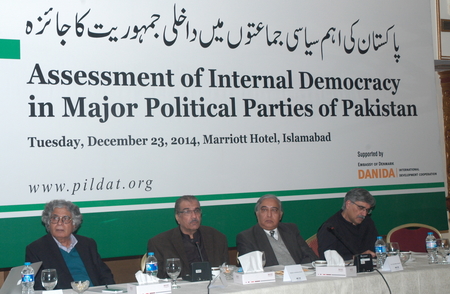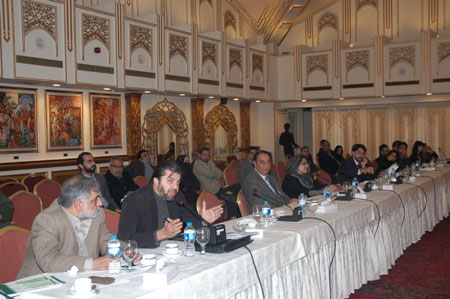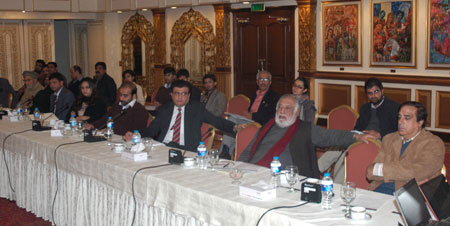|
|
| |
| EVENTS |
|
|
> PTI strongest and PML-N weakest in internal democracy: PILDAT Score Card
|
|
|
| |
PILDAT launches Report on Assessing Internal Democracy of Major Political Parties of Pakistan:
- Generally, internal democracy is weak in political parties
- Constitutions are fairly democratic but implementation of party constitutions is weak
- Decision-making in political parties needs to be more democratic & institutionalized
- Reporting on annual audited accounts of parties should be improved
- Continuation of Democracy in Pakistan is crucial to foster internal party democracy
December 23; In a systematic analysis evaluating internal democracy of political parties in Pakistan, the Pakistan Tehreek-e-Insaf (PTI) has emerged as the most democratic party while the Pakistan Muslim League-Nawaz (PML-N) is ranked as the least democratic party.
The PILDAT Report on Assessing Internal Democracy of Major Political Parties of Pakistan concludes that the overall score of 43 out of 100 on internal democracy in the selected eight political parties depicts that the state of internal democracy of political parties in Pakistan is weak with serious gaps.
Within this overall score, the highest score is assigned to the Constitutions of the political parties. The internal democracy guaranteed by the party constitution has received 54 % score.Regularity of Parliamentary Parties meetings has received a score of 53 % which is the second highest among the thirteen indicators.Active participation of Women, Youth and Minorities in the parties� affairs has been given a score of 52 %, which is the third highest score.Democratic change in the top leadership of political parties has received the least scores, i.e., 30 % indicating that seldom do political parties allow democratic change of their top leaders unless it is forced by the circumstances such as death or, in some cases, exile. In the same context, the tradition of dynastic leadership has also found disapproval with the assessors and the question of how far is this practice discouraged in parties received a score of 45 %. Credibility of political parties� statements of accounts and their funding base has also been a matter of concern for the assessors and the second lowest score i.e., 35 % is granted to this indicator. The third lowest score is granted to the tolerance of dissent within political parties which receives 36 % score. Internal Party Election, an important indicator of democracy within the parties, has received 49 % score, which is the fourth lowest score among the 13 indicators.
Open and keenly contested party election at all levels in 2012-2013 and regular core committee meetings have apparently favoured the PTI to become the most democratic party while lack of regular party election, lack of regular meetings of party bodies such as Central Working Committee and National Councils, visible trends of dynastic party leadership and no change in top party leadership for the last many years seem to be the factors which adversely affected the democratic credentials of the PML-N. The PML-N is followed by the PPP which is rated as the second least democratic party among the eight parties evaluated. Almost similar factors impacted the democratic credentials of the PPP.
In order to assess democracy within political parties objectively and scientifically, a framework consisting of thirteen (13) indicators was devised by a broad-based Steering Committee constituted by PILDAT.Eight (8) major political parties were selected for the assessment. Five of these parties hold the largest number of seats in the National Assembly. A party-wise account of each of the thirteen (13) indicators has been compiled after collecting data from various sources including the political parties. This account, then, became the basis of quantitative assessment (scoring) for the parties. |
|
| |
The PILDAT Score Card assessing internal democracy of 8 political parties in Pakistan places the Jama�at-e-Islami (JI) with 56% score, the PTI with 49% score, the Awami National Party (ANP) with 46% score, the Jamiat Ulema-e-Islam-FazlurRehman (JUI-F) with 43% score, the National Party (NP) with 43% score, the Muttahida Quami Movement (MQM) with 42% score, the Pakistan Peoples Party (PPP) with 34% score and the PML-N with 32%.
Even though the JI has been rated as the most democratic party due to regular party election, regular change in top leadership, lack of dynastic leadership in the party, it has a unique system (limited membership based on extensive scrutiny; no candidature or election campaigns allowed during party election, etc.).
The 8 political parties have been evaluated based on the following PILDAT indicators of internal democracy of political parties:
|
|
| |
- Democratic character of the party constitution;
- Regular and Competitive party elections;
- Effectiveness of intra-party structures such as Central Executive Committee;
- The number of party officials elected verses nominated;
- Role of local party chapters in selecting party candidates for legislatures;
- Regular meetings of parliamentary parties;
- Tradition of annual general meetings or conventions;
- Discouragement of dynastic leadership;
- Regular change in party leadership;
- A broad funding base and credible party accounts;
- Tolerance of dissent within the party;
- A democratic decision-making process; Active participation of women, youth and minorities in the party affairs, and
- A current and comprehensive party website.
|
|
| |
The PILDAT Score Card presents the key points under each indicator of eight political parties:
Table 1: PILDAT Score Cardon Assessing Internal Democracy of Major Political Parties of Pakistan
 |
|
| |
Members of the Steering Committee include (in alphabetical order by first name) Mr. Ali Zafar, Advocate Supreme Court; Senior Partner, Mandviwalla and Zafar, Mr. Arif Nizami,Editor, Pakistan Today, Mr. Ghazi Salahuddin, Columnist, The News, Dr. Huma Baqai,Associate Professor, Department of Social Sciences, IBA Karachi, Prof. Muhammad Waseem, Department of Political Science, LUMS, Mr. Mujib-ur-Rehman Shami,Editor in Chief, Daily Pakistan, Dr. Parvez Hassan,Senior Advocate Supreme Court of Pakistan, Mr. Shahid Hamid, Senior Advocate Supreme Court of Pakistan; Former Governor Punjab, Mr. Suhail Warraich,Columnist, Daily Jang and Anchor, Geo TV, Dr. Syed Jaffar Ahmed, Director, Pakistan Study Centre, Karachi University, Prof. Dr. Tahir Amin, Director, National Institute of Pakistan Studies, QAU, Mr. Ahmed Bilal Mehboob, President, PILDAT and Ms. Aasiya Riaz, Joint Director, PILDAT. |
|
| |
|
|
| |
|
|
| |
|
|
| |
|
|
| |
|
|
| |

|
|
| |
|
|
| |

|
|
| |
|
|
| |

|
|
|
|
|
|
|
|
|